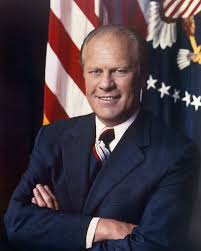Gerald Ford: A Legacy of Leadership and Unity

Introduction
Gerald Ford, the 38th President of the United States, remains a pivotal figure in American history, particularly for his leadership during the post-Watergate era. His presidency, which lasted from 1974 to 1977, came at a time of significant national turmoil and challenges, making his role critical in rebuilding trust in government and fostering unity within a divided nation.
Early Life and Career
Born on July 14, 1913, in Omaha, Nebraska, Ford’s early years set the stage for a life of public service. He was a star athlete in high school and went on to study at the University of Michigan, where he played football. After serving in the U.S. Navy during World War II, he returned to Michigan and pursued a career in law and politics.
In 1948, Ford was elected to the House of Representatives, where he served for 25 years. Known for his integrity and bipartisanship, he earned respect across the aisle, a trait that would aid him significantly during his presidency.
Presidency and Key Events
Ford’s ascension to the presidency was unprecedented. Following Richard Nixon’s resignation amidst the Watergate scandal, Ford was appointed as Vice President and later became President. One of his first and most controversial decisions was to grant Nixon a full pardon for any crimes he may have committed while in office. While this act aimed to help the nation heal, it faced considerable backlash and significantly impacted Ford’s popularity.
During his presidency, Ford dealt with various critical issues, including rising inflation, economic recession, and a foreign policy shaped by the Cold War dynamics. His administration’s most notable achievements include the Helsinki Accords, which improved East-West relations, and efforts to address energy crises.
Legacy and Significance
Gerald Ford’s presidency, though often overlooked, marked a transitional period in American politics. He exemplified a commitment to healing the nation and restoring faith in government, often emphasizing the importance of unity and cooperation. His efforts laid the groundwork for subsequent administrations aiming to improve public trust and accountability in leadership.
As discussions around presidential legacies continue, Ford’s unique position as a leader during a time of crisis serves as a reminder of the resilience and adaptability necessary in governance.
Conclusion
In reflection, Gerald Ford’s impact on American history cannot be understated. His call for healing and reform still resonate today, offering lessons in integrity and leadership. As the nation grapples with its own challenges, Ford’s legacy remains relevant, serving as a guiding principle for future leaders striving for unity in governance.









